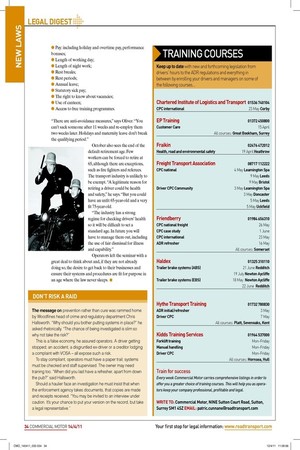Staying in the loop
Page 21

Page 22

Page 23

If you've noticed an error in this article please click here to report it so we can fix it.
2011 is shaping up to be a year where lawmakers are busier than ever. Don’t get caught out
Words: Patric Cunnane Never let it be said that the road transport industry is short of regulations – like buses, new ones arrive at intervals, but not always when expected.
No wonder then that Cambridge-based Woodines Solicitors thought it was worthwhile to run a half-day seminar to brief local operators on current legislation and new rules to consider in the future.
Woodines’ own transport supremo Tim Ridyard kicked off proceedings with a brisk summary of some key changes:
A raft of changes
Access to Occupation of Road Transport Operator, coming into force 4 December 2011. A raft of changes under this regulation include: ● Part-time transport managers will be limited to running a maximum of four operations with a total of 50 vehicles; ● Transport managers may be called solo to a public inquiry (PI), without the PI being based on the company’s record. Those who lose their repute will not be able to work as a transport manager in any member state; ● International and national CPCs will be merged and grandfather rights abolished. Henceforth, there will be just one transport manager qualiication; ● A pan-European database of serial offenders goes live in 2013 and information will be available to EU enforcement agencies; ● Financial standing rules will be relaxed to allow the requirement to be proved by a inancial guarantee. An operator normally demonstrates inancial standing by proving they have cash in the bank, at present £8,100 for the irst truck and £4,500 for additional vehicles; ● The Department for Transport has begun a consultation process that ends on 20 May: http://dft.gov.uk/ consultations/open/2011-11/
Fixed penalty set to double
Transport managers who are doing their job properly should heed Ridyard’s warning that the ixed penalty for certain speeds is set to double to six points from three. This will occur when a driver is driving more than 20mph above the speed limit. “Thus 52mph in a 30mph zone would trigger six penalty points,” says Ridyard.
The later introduction of graduated ixed penalties (GFPs) covered a wider range of offences. VOSA says that few drivers, perhaps fewer than 1%, appeal within the allowed 28 days. “There is no incentive to test the matter in court,” says Ridyard. “Challenging VOSA can cost £250 to £400, plus costs if you lose. However, where we have contested GFPs, we have always won.” VOSA regional oficers Bill Harrison and Derrick Howlett summarise the development of the new Authorised Testing Facilities. “We have 50 up and running, some are conversions, some are new and there are 16 new ones in the system,” says Harrison. “We have 32 that are open access.” Test centres run by VOSA in Birmingham, Mitcham, Gloucester and Liverpool are set to close in July. “Before we close a site we have to make sure there are existing facilities to ensure that 90% of operators will be within 60 miles of a test station,” says Harrison.
A lively Q&A challenged the VOSA speakers to explain why PG9s were sometimes issued for trivial offences. One haulier complained that his driver was issued with a prohibition for a failed brake light, while holding a spare bulb in his hand. Harrison advised the operator to complain to VOSA’s area manager as prohibitions can be removed. “However, we must know the condition of the vehicle at the time it was stopped,” he adds.
Howlett says that most stops are driven by the OCRS trafic light system. “A red light vehicle will always be stopped before a green,” he says.
What operators should plan for
New employment law affects the industry. Stephen Oliver, Woodines head of its commercial department, lagged up issues that operators must plan for now – namely new rights for agency workers and a change to retirement rules.
From 1 October, agency workers must receive equal treatment with employees after 12 weeks on the following basic conditions: “There are anti-avoidance measures,” says Oliver. “You can’t sack someone after 11 weeks and re-employ them two weeks later. Holidays and maternity leave don’t break the qualifying period.” October also sees the end of the default retirement age. Few workers can be forced to retire at 65, although there are exceptions, such as ire ighters and referees. The transport industry is unlikely to be exempt. “A legitimate reason for retiring a driver could be health and safety,” he says. “But you could have an unit 65-year-old and a very it 75-year-old.
“The industry has a strong regime for checking drivers’ health so it will be dificult to set a standard age. In future you will have to manage them out, including the use of fair dismissal for illness and capability.” Operators left the seminar with a great deal to think about and, if they are not already doing so, the desire to get back to their businesses and ensure their systems and procedures are it for purpose in an age where the law never sleeps. ■









































